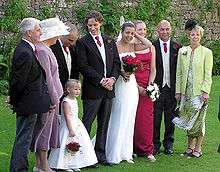Marriage in Northern Ireland

Marriage in Northern Ireland is legally defined as between a man and a woman. Civil partnerships became available to same-sex couples in December 2005 and grant rights and responsibilities identical to civil marriage. There are residency conditions that have to be met prior to marriage. If one of the parties wishing to marry is subject to immigration control, notice of marriage can only be given at a register office, which both parties must attend together. The marriageable age is 17 with consent but 18 otherwise. Marriage must be between two otherwise unmarried people (foreign divorces are generally recognised, but existing foreign polygamous marriages prevent a marriage as this would be treated as bigamy).
Certain relatives are not allowed to marry each other.
Marriage procedures
The ceremonial side of marriage procedures in Northern Ireland are in many ways similar to those in England and Wales, but there is no restriction on the location of a religious marriage and the notification and registration involve a marriage schedule.
Benefits and consequences
Upon death of one's spouse, bequests to the other spouse do not incur inheritance tax. Intestate property by default will go to the spouse. Also, there is partial inheritance of pensions.
Non-British spouses of British citizens may obtain residence permits.
Spouses are considered to have a duty of care towards each other, and certain social security benefits are calculated differently from those for single people.
Foreign citizens wishing to marry in the UK
From 1 February 2005, visitors who wish to be married in the UK that are a citizen of a country that is not a member of the European Economic Area (EEA) must apply for a visa before they travel. Without the visa, the registrar will not be able to accept the notice of marriage and will not be able to perform the marriage ceremony.
Those already in the UK and citizens of a country that is not a member of the EEA need the approval of the Home Secretary to be married. This will be provided in the form of a certificate of approval.
Divorce
Divorce is allowed on various grounds. Civil remarriage is allowed. Religious denominations differ on whether they permit religious remarriage.
History
In the period 1759-1826 many couples from Ireland went to Scotland to marry, particularly to Portpatrick, Wigtown which was described as the Gretna Green for Ireland. There was a daily packet boat from Donaghadee, and marriages were conducted by the Church of Scotland minister at Portpatrick, though according to Brack (see Portpatrick) he often overlooked the rules about the publication of banns or the required period of residence.